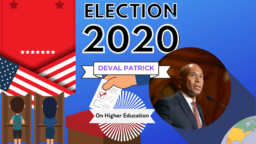Deval Patrick, the former Massachusetts governor, is officially joining the 2020 Democratic presidential race.
With only three months until voters cast their ballots, Patrick is expected to rival Joe Biden and Pete Buttigieg as the more moderate Democratic candidate in a field led by progressives such as Bernie Sanders and Elizabeth Warren.
His announcement comes just one day before the filing deadline for the New Hampshire primary, which will be pivotal to his campaign, as New Hampshire neighbors his home state of Massachusetts.
Having grown up with his family in a two-bedroom tenement in the South Side of Chicago, Patrick is a strong proponent of giving people the opportunity of upward mobility. Personally, he is the first in his family to go to college and law school. He’s also had the opportunity to work in nonprofits and in business.
“I’ve had a chance to live my American dream,” Patrick says in his announcement video. “But over the years, I’ve seen the path to that dream gradually closing off bit by bit.”
Patrick understands that the path to upward mobility relies on a strong education system. Once named America’s Greatest Education Governor by the National Education Association, Patrick has done a lot to advance public education in the state of Massachusetts and improve the high school to college pipeline for low-income students.
And although he has not yet announced a definitive higher education platform for his candidacy, his past actions as governor point to a few steps he may take if elected president.
Notably, Patrick has been a long-time proponent of free community college, first suggesting the idea back in 2007. Although his plan was not approved, he helped lay the groundwork for what has now become a free community college movement across the United States.
As governor, Patrick also pushed forward a set of strategies that would make it easier for students to transfer courses and credits across higher education institutions in Massachusetts. That way, transferring from community college to a four-year institution would be more feasible for students.
In 2010, Patrick played a role in launching The Vision Project, which aimed to increase students’ ability to engage in research, academic and career opportunities at state universities and ensure they’re receiving the skills they need for postsecondary and lifelong success.
Also under Patrick’s governance, the Massachusetts Board of Higher Education voted to create the University of Massachusetts School of Law – Dartmouth, the state’s only public law school. The intention was to create an opportunity for students, who may not otherwise have been able to afford it, to study law.
Altogether, under Patrick’s leadership, the state of Massachusetts invested more than $2 billion in state colleges and universities.
But Patrick’s most notable accomplishment as governor came at the K-12 level when he signed the Achievement Gap Act into law. The purpose of the legislation was to make sure black, Hispanic and low-income students receive the same quality education as white or more affluent students.
And during Patrick’s time as governor, there was a 20-point increase in the National Assessment for Educational Progress (NAEP) test scores of white students and a 28-point increase in the performance of black students.
“I got my break. But you and I know that there were lots of other kids on the South Side of Chicago just like me — just as wide-eyed and hopeful, just as eager to learn, just as curious and ambitious — but who didn’t get their break,” Patrick said in a video accepting his NEA award for America’s Greatest Education Governor.



